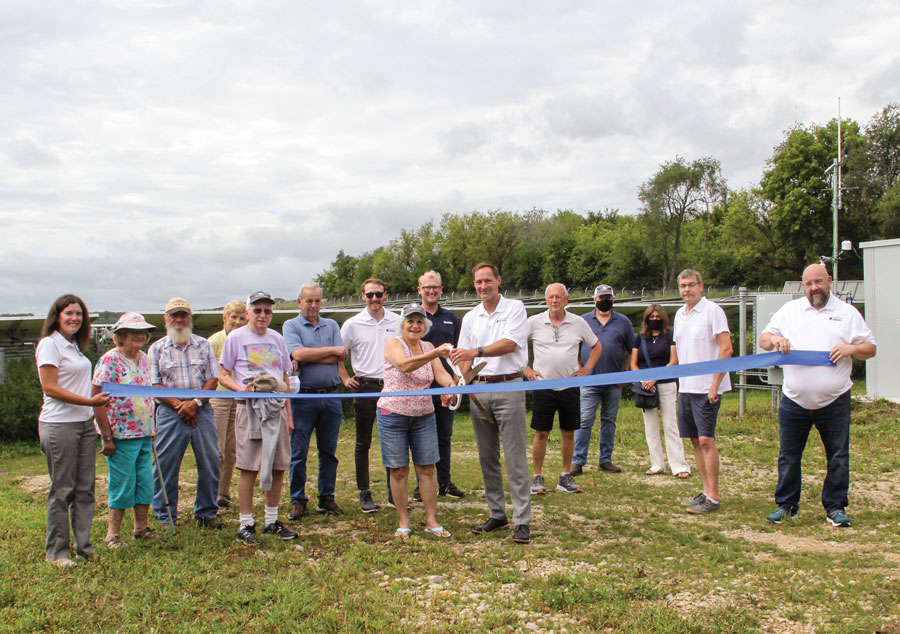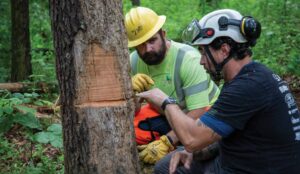What do you do with your spare change? Does it end up in your purse or pocket, on the floor of your car or under your couch cushions? What if it went to a good cause instead?
Some electric co-ops turn the equivalent of spare change donated from each participating member into assistance for local programs and services. They round members’ bills up to the next dollar and use the difference for community grants.
Developed in 1989 at Palmetto Electric Cooperative in South Carolina, the concept of Operation Round Up is simple. If your bill totals $156.62, you’ll be charged a flat $157 with your donation for the month adding up to 38 cents. On average, members who participate in the program spend 50 cents per month to support it.
Round Up programs use either an “opt-in” or “opt-out” basis for receiving member donations. With “opt-in,” members can sign up if they want. With “opt-out,” all members are automatically enrolled and can request to stop participating at any time.
Egyptian Electric Cooperative Association’s Round Up program’s first grants will be awarded early 2022.
President/CEO Shane Hermetz has been excited about the program. He says, “If every residential account participated in Round Up, we could bring in more than $90,000 per year. What could we do and give back into our community to make the difference? It’s the power of the change in your pocket that could make the difference.”
The proof of this is in the Operation Round Up programs already in operation. Spoon River Electric Cooperative began collecting funds for the program several years ago. “To date, we’ve helped around 53 organizations throughout our community totaling $97,825,” says Taryn Mellert, the co-op’s human resources director and executive assistant.
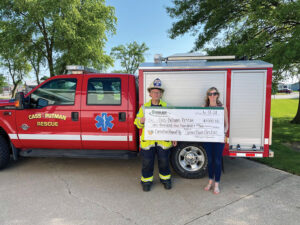
Spoon River’s committee has approved several grants for projects that may have otherwise remained unfunded. “We’ve been able to give a lot to our volunteer fire departments,” says Mellert. “They aren’t funded through a lot of tax money like the big ones.”
Cass-Putman Rescue, which operates solely off grant funds, has received Round Up grant funding for portable radios. Bobby Schnarr, chief of the rescue squad, says, “It’s about the trickle-down effect. Spoon River Electric came to our rescue by coming up with Operation Round Up and giving money to us. We give it back to the people who have donated it. They may be saving a family member or even their own life because they supported us or other organizations like us to buy that equipment that helps us come out to a call for them.”
Operation Round Up was invaluable during the worst of the COVID-19 outbreak. Almost everything had shut down, people were laid off and money was tight. Mellert says they were able to mail $9,000 in needed funding to local food pantries.
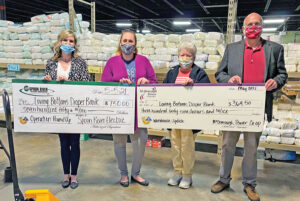
Spoon River and McDonough Power demonstrated the cooperative spirit by co-funding a project located on the border of their service territories. Kelly Hamm, energy services manager at McDonough Power Cooperative, says, “We teamed up with Spoon River Electric to fund Loving Bottoms Diaper Bank. They were seeking funds to purchase a pallet jack and carpet tiles for their warehouse.”
McDonough Power’s Round Up program has been in place since 2015 and has funded 75 projects totaling $134,121.
McDonough Power’s program operates on an “opt-out” basis. Hamm says some members were skeptical at first, concerned that the donated money was funding national programs. True of all Round Up programs, any funds raised stay in local communities. Hamm says, “Members appreciate knowing that their small change is doing big things in the community, and they can see where their donations are going.”
McDonough Power has retained 88 percent of members in the Round Up program, and Hamm says some of them like having a nice round billing amount. Even if members initially opted out, she’s seen many opt back in because a grant helped something important to them.
One of Hamm’s most memorable projects funded through the program was for St. Paul’s third grade classroom. “Mrs. Gray requested funding for flexible classroom seating. Not only was her request fully funded, but we also surprised her and the class by arriving unannounced to tell them the news,” Hamm recalls. “It was so fun.”
Hamm says the co-op will continue to get the word out about the Round Up program to fund as many community-betterment projects as possible.
M.J.M. Electric’s Round Up program just got off the ground with its first two grants. Brooke Gross, M.J.M.’s communication and member services coordinator, runs the program.
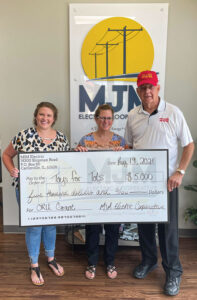
“It came at a perfect time,” explains Gross. “The world shut down [due to COVID-19] and all these places that are donation driven are hurting. This was the light at the end of the tunnel. It was cool to see the co-op give back.”
Toys for Tots in Medora received M.J.M.’s first grant. One of its big donors had cut all its funding. Gross says, “All of a sudden M.J.M. had this program so it was a huge blessing.” The co-op’s board unanimously voted to give the program the maximum $5,000 grant.
Gross says she has fallen in love with Round Up. “There’s so much you can do with it. The sky’s the limit.”
One of the longest running programs in the state is Adams Electric’s Penny Power program. Launched in 2005, it is a round-up program that the co-op personalized. Thus far, 1,000 grants totaling $561,208 have been awarded through member donations.
“It’s the best PR we’ve ever received,” says Bill Stalder, the co-op’s manager of marketing/member services. “It allows us to share ‘feel good’ stories and shows the co-op cares about the communities we serve. Funds have touched every corner of our service territory.”
An early grant presentation was one of Stalder’s most memorable. The Quincy Citizen Police Academy Alumni Association had been raising money for an emergency response vehicle for years and requested funding for it.
“They knew they had qualified for a grant, and the fact that it was for $5,000 was a surprise,” recalls Stalder. “I saw them tear up and hug each other. It was a significant amount – more than they expected, and it was the money that put them over the top to reach their goal.”
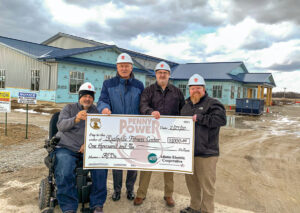
Stalder enjoys running the Penny Power program and meeting people. “I put on my Ed McMahon hat, make an appointment and show up and get the photo,” Stalder says. “Sometimes it’s in front of the shelter house they’re refurbishing or the big display of backpacks they’re giving away.”
Over the years, Stalder has seen his share of thank you cards and notes, especially from young children whose classes are benefitting from the grant. Laughing, he says, “The teachers will have them each write something. They [the notes] come in a big packet, written in crayon spelled all kinds of ways.”
“We’ve given $561,000 one penny at a time,” says Stalder. “To me it’s remarkable. At a typical annual meeting, I’ll update the membership. People can’t believe how that money is doing so much good, especially when you’re talking about a handful of pennies per member per billing period. It shows the power of the penny.”
Many co-ops participate in a round up type program to help the communities they serve. Hermetz explains, “I want to make a positive difference in the lives of people who live in the area. If we could provide funding to purchase an AED that saves a life, that would be invaluable to the community. If funding is used for scholarships and food pantry support, that affects real people. That goes above and beyond providing electric service in rural America.”

